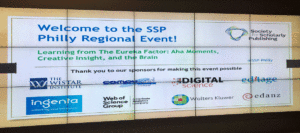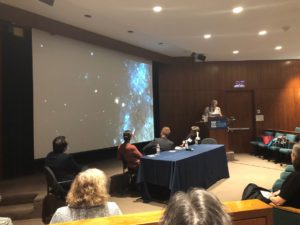Eureka or aha moments are sudden realizations that expand our understanding of the world and ourselves, conferring both personal growth and practical advantage. Such creative insights, as psychological scientists call them, were what conveyed an important discovery in the science of genetics to Nobel laureate Barbara McClintock, the melody of a Beatles ballad to Paul McCartney, and an understanding of the cause of human suffering to the Buddha. But these moments of clarity are not given only to the famous. Anyone can have them.
 What happens in the brain? On April 30, 2019 at the SSP Philadelphia regional event, Dr. John Kounios shared his insight on applied cognitive and brain sciences to introduce some factors that influence enlightening moments and illustrate what is happening on a physiological level in our brains when we experience such moments.
What happens in the brain? On April 30, 2019 at the SSP Philadelphia regional event, Dr. John Kounios shared his insight on applied cognitive and brain sciences to introduce some factors that influence enlightening moments and illustrate what is happening on a physiological level in our brains when we experience such moments.
Members from SSP, students, and publishing professionals gathered at Philadelphia’s Wistar Institute to consider inspiration, breakthroughs, synchronicity, and insight. Dr. Kounios took us back to the Gestalt Psychology movement to explain meaningful perception of an experience, object, or situation. He reminded folks in the room that insight can suddenly (almost magically) reveal itself. Yet behind the gray curtain, so much is actually going on.

Figure 1. John Kounios, PhD, Director, PhD Program in Applied Cognitive & Brain Sciences and Professor of Psychology at Drexel University.
Using EEG and fMRI, scientists have mapped the location of a neural insight marker in the brain along with brain waves and patterns that precede the moment of clarity.
Throughout the evening, a mixed panel of academic leaders from various fields—chemistry, forensic anthropology, oncology, and neuroethology—shared their own “eureka” moments as well as the external and internal attributes that also took place.
David Salas-de la Cruz, Assistant Professor for the Department of Chemistry and Center of Computational and Integrative Biology at Rutgers University—Camden, explained how pondering a problem (over time) regarding how fast a raindrop falls, he had an epiphany moment in the shower. Envisioning himself as the raindrop, it suddenly occurred to him how the problem might be solved. While teaching chemistry, he strives to create an environment that helps students be less anxious in hopes they will have more epiphany moments. He started the Eurkea Effect podcast to hear more about these Aha moments from others.
Kimberlee Moran is a forensic anthropologist, Associate Teaching Professor and Director of Forensics at Rutgers University–Camden. She shared a story about her first job out of college working on a pre-building archeology site examination for $11.50/hour. Recognizing the salary was not sustainable, she went back to school for forensic archaeological science. Her Aha moments are collaborative—“four brains are better than one when it comes to innovating.” Kimberlee became interested in fingerprinting analysis and she experienced a profound thought that ancient artifacts hold fingerprints but archaeologists hadn’t thought to do anything with them. As a result of this “eureka moment” she founded the Ancient Fingerprint Society.

Figure 2. Think outside the box.
Nathan Fried, Assistant Professor and Assistant Director for Undergraduate Research and Education at Rutgers University–Camden, said that most of his epiphanies involve his personal life but, in the lab, he mostly proceeds in an analytical fashion. The exception to this is his work with rodents, which has led to his most creative solutions. Nathan says you think of your protocols and realize with liberation you don’t have to follow them. His takeaway, and something he strives to do both in the lab and the classroom, is that we must be good storytellers. If you are not a good storyteller, you will hit a wall in terms of making an impact in your field, including science.
Maureen E. Murphy, Program Leader and Professor, Molecular and Cellular Oncogenesis at The Wistar Institute, has had a lifelong mission to cure cancer. She runs a lab with six people and depends on grants from the National Cancer Institute (NCI) to operate the lab and pay her staff. With only 8% of submitted grants funded by the NCI, funding her lab requires major effort. NCI reviewers fund grants that demonstrate hypothesis-driven research. The problem with hypothesis-driven research is you don’t use insights—it is all analytical. Instead of starting with a hypothesis, Maureen starts with the data and uses it to guide her in formulating a hypothesis. While Maureen’s lab at The Wistar Institute applies the more analytical approach to research in order to secure funding, she publishes her “Aha” research.
Throughout the evening, the discussion focused on ways we can influence cognitive style to solve more problems and have deeper insights that benefit us as individuals and society. Mood, proper sleep, a quiet setting all seem to have a profound impact on focusing the mind to allow breakthrough moments. Aha! Aren’t these the same things our teachers and parents urged we strive for during our youth?
“Highlighting the effect of positive moods/environments on eureka effects and talking more on the benefits of cross-disciplinary team science, as a concept, was excellent to hear more about,” stated Adrian Stanley, Managing Director, Publishers, Digital Science, & SSP President. “Hearing each of the speakers’ backgrounds and Eureka/aha moments was very practical, engaging, and to me, connected the audience together with the session and panelists.”
Tyler Whitehouse, President at Gigantum summarized the event and SSP perfectly: “I pursued mathematics because it was the best way to have the kinds of joyous Aha! moments the panel discussed. It was very interesting to learn about the research on it and how it mirrored my own experiences. Even better, while at the panel I had an Aha! moment when I realized that SSP really cares about science!”
The SSP Philadelphia Regional events provide a forum for anyone in the tri-state region to come together and engage in thought-provoking insights on a range of scholarly topics. Events are welcoming to all interested participants. Learn more on the Society for Scholarly Publishing website.
Event recap reported by Marianne Calilhanna.


Join the Conversation
You must be logged in to post a comment.